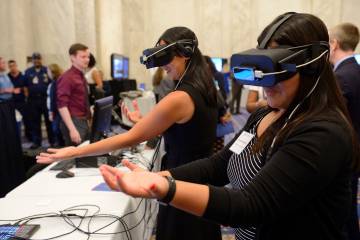Thirty-three promising early-career faculty members from eight divisions of the university will receive 2019 Johns Hopkins Catalyst Awards.
These faculty members—representing 26 university departments—will use the awards to pursue a wide range of projects, such as investigating the redemptive role of emergency response efforts for military organizations in the Middle East, creating high-performance catalysts with novel materials, or creating a musical composition based on Zadie Smith's "Speaking in Tongues" lecture about President Obama's distinctive voice and use of language. Other recipients are investigating treatments and interventions for ovarian cancer and heart failure. One awardee is working to improve postoperative outcomes for older adults, while another is evaluating the nature and rates of Earth's tectonic changes.
"By supporting the creative and ambitious research of early-career faculty, we are investing not only in the future of these exceptional scholars but of the entire academic enterprise," Johns Hopkins University President Ronald J. Daniels says. "And there is no more urgent time than the present to renew our commitment to those whose ideas will improve the condition of our world and its people."
The 2019 honorees—selected on the basis of their accomplishments to date, creativity and originality, and academic impact—will each receive a $75,000 grant to support their work over the next year. They also will have the opportunity to participate in mentoring sessions and events designed to connect these colleagues at similar stages in their careers.
The Catalyst Awards program was launched in early 2015, as was the Discovery Awards program for interdivisional collaborations. Together the two programs represent a $30 million university investment in faculty-led research by university leadership along with the deans and directors of JHU's divisions.
The Catalyst Awards program is open to any full-time faculty member appointed to a tenure-track position at least three and no more than 10 years ago. More than 90 senior faculty members from across the university served on the committee that selected the awardees from a pool of 115 submissions.
This is the fifth year of the program; a combined 137 faculty were recognized during its first four cycles. Recipients are celebrated alongside the winners of the Discovery Awards at an event each fall.
"Once again, we were thrilled with the strength of proposals submitted for this year's Catalyst Awards," says Denis Wirtz, JHU's vice provost for research. "This hallmark program to support our early-career faculty will enable a huge range of scientific and creative discovery. We look forward to celebrating the newest inductees into this fantastic cohort."
2019 Johns Hopkins Catalyst Award recipients
- Judah Adashi, Composition, Peabody Institute
- Charles Brown IV, Anesthesiology and Critical Care Medicine, School of Medicine
- Ling Chen, Political Economy, School of Advanced International Studies
- Jeremiah Cohen, Neuroscience, School of Medicine
- Michael Darden, Carey Business School
- Meghan Davis, Environmental Health and Engineering, Bloomberg School of Public Health
- Ryuya Fukunaga, Biological Chemistry, School of Medicine
- Raquel Greer, General Internal Medicine, School of Medicine
- Anthony Shoji Hall, Materials Science and Engineering, Whiting School of Engineering
- Anne Hamacher-Brady, Molecular Microbiology & Immunology, Bloomberg School of Public Health
- Macey Henderson, Surgery, School of Medicine
- Abhishek Jain, Computer Science, Whiting School of Engineering
- Cynthia James, Cardiology, School of Medicine
- Lieny Jeon, School of Education
- Sarah Jordaan, Energy, Resources, and Environment, School of Advanced International Studies
- Caitlin Kennedy, International Health, Bloomberg School of Public Health
- Harry Larman, Pathology, School of Medicine
- Brandyn Lau, Radiology and Radiological Science, School of Medicine
- Chen Li, Mechanical Engineering, Whiting School of Engineering
- Jian Liu, Cell Biology, School of Medicine
- Dora Malech, Writing Seminars, Krieger School of Arts and Sciences
- Cyrus Mintz, Anesthesiology & Critical Care Medicine, School of Medicine
- Sarah Parkinson, Political Science and International Studies, Krieger School of Arts and Sciences and School of Advanced International Studies
- Marie-France Penet, Radiology and Radiological Science, School of Medicine
- Jonathan Perry, Functional Anatomy and Evolution, School of Medicine
- Sarah Preheim, Environmental Health and Engineering, Whiting School of Engineering
- Zhaozhu Qiu, Physiology, School of Medicine
- Giorgio Raimondi, Plastic and Reconstructive Surgery, School of Medicine
- Rosanne Rouf, Cardiology, School of Medicine
- Michael Shields, Civil Engineering, Whiting School of Engineering
- Daniel Viete, Earth and Planetary Sciences, Krieger School of Arts and Sciences
- Jingyan Xu, Radiology and Radiological Science, School of Medicine
- Du Yun, Composition, Peabody Institute
Posted in University News, News+Info
Tagged faculty, faculty news, catalyst awards, research








